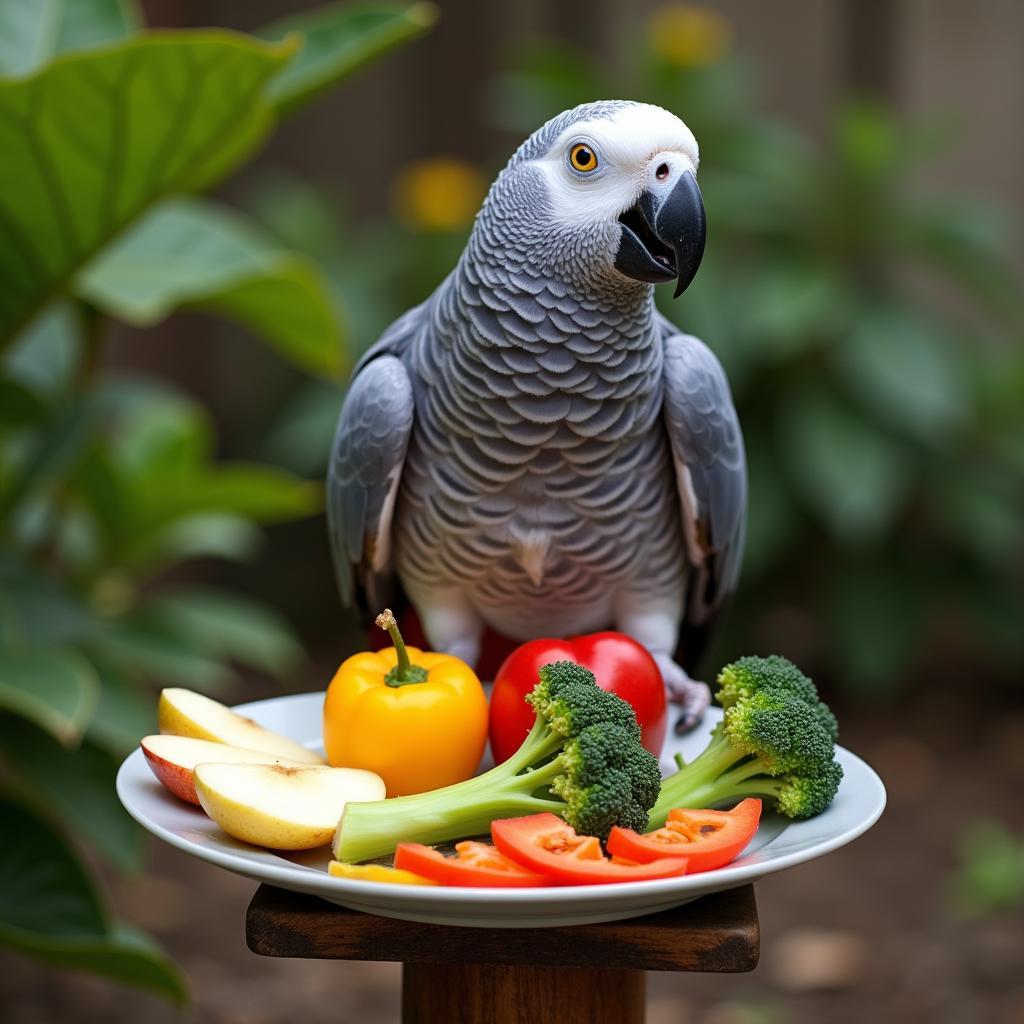How Much Should an African Grey Eat? Understanding Your Parrot’s Food Quantity Needs
African grey parrots, with their striking plumage and remarkable intelligence, make wonderful companions. But like any pet, they require specific care to thrive. One crucial aspect of owning an African grey is understanding their dietary needs, particularly “African Grey Food Quantity”. Providing the right amount and type of food is essential for their overall health and well-being.
Factors Influencing African Grey Food Quantity
Several factors influence how much an African grey should eat daily. It’s not a one-size-fits-all answer.
- Age: Baby African greys, especially during their weaning period, have different dietary needs than adults. They require more frequent feedings and a higher calorie intake to support their rapid growth.
- Activity Level: Just like humans, a more active African grey will burn more calories and require more food. A parrot that spends most of its day in its cage will naturally need less food than one that enjoys regular flights and playtime.
- Metabolism: Each bird, like humans, has a unique metabolism. Some African greys naturally burn energy faster than others, impacting their food intake needs.
- Overall Health: A healthy African grey will typically have a good appetite. However, if your parrot is unwell or recovering from an illness, its food intake might decrease. Consult your avian veterinarian if you notice any significant changes in your parrot’s eating habits.
A General Guideline for African Grey Food Quantity
While individual needs vary, a general guideline for an adult African Grey parrot’s daily food intake is about 1/4 to 1/2 cup of formulated parrot pellets. african grey parrot food requirements can provide more detailed insights into creating a balanced diet.
Beyond Pellets: Supplementing Your African Grey’s Diet
Pellets should constitute the foundation of your African grey’s diet, providing essential nutrients. However, a varied diet is crucial for their well-being.
Here’s a breakdown of what to feed your African grey:
- Fruits and Vegetables: Aim for a variety of fresh fruits and vegetables, making up about 20-30% of their diet.
- Healthy Seeds and Nuts: Offer these in moderation as treats due to their high-fat content. Consider healthy options like almonds, walnuts, and pumpkin seeds.
- Cooked Foods: Occasionally offer small portions of cooked foods like brown rice, quinoa, or steamed vegetables.
african grey food ideas can help you expand your parrot’s menu with healthy and delicious options.
Monitoring Your African Grey’s Weight and Adjusting Food Quantity
Weighing your African grey regularly is crucial to ensure they are maintaining a healthy weight. Any significant fluctuations, either gain or loss, warrant a visit to the avian vet.
- Underweight: If your African grey is underweight, consider increasing their daily food intake slightly and providing higher-calorie treats like nuts and seeds in moderation.
- Overweight: For overweight parrots, gradually decrease the amount of high-fat treats and encourage more physical activity through playtime outside the cage.
What If My African Grey Is a Picky Eater?
African greys, despite their intelligence, can sometimes be picky eaters. Introducing new foods gradually and persistently is key.
- Patience is Key: Don’t be discouraged if your parrot doesn’t take to a new food immediately. Keep offering it in different ways.
- Mix It Up: Try mixing new foods with those your parrot already enjoys to make them more appealing.
- Presentation Matters: Sometimes, simply changing how you present the food can make a difference. Try offering it chopped, grated, or whole.
 African Grey Enjoying Fruits and Vegetables
African Grey Enjoying Fruits and Vegetables
Conclusion
Understanding your African grey’s “african grey food quantity” needs is crucial for their long-term health and happiness. Remember to consider their age, activity level, and overall health when determining their food intake. Regular monitoring, a varied diet, and plenty of love and attention are the keys to a thriving African grey companion.


